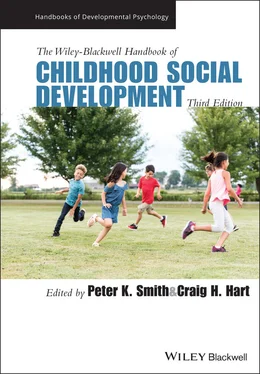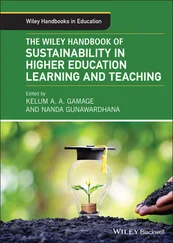12 PART V: Child Characteristics CHAPTER SIXTEEN: Temperament and Social Development in Childhood What is Temperament? Measurement of Temperament Temperament and Social Development: Theoretical Perspectives Temperamental Influences on Social Competence Temperamental Influences on Emotional and Behavioral Problems Temperament‐Based Interventions Concluding Comments and Future Directions References CHAPTER SEVENTEEN: Gender Differences in Children’s Play Gender Differences in Play: Emergence, Magnitude, and Trajectory Gender Differences in Play: Long‐Term Implications Early Hormonal Influences on Gender‐Related Play Parental Influences on Gender‐Related Play Sociocognitive Influences on Gender‐Related Play Integrating Different Perspectives: Joint Influences on Development Conclusions References CHAPTER EIGHTEEN: Race and Ethnicity in the Context of Children’s Social Development Social Cognitive Developmental Theories about Race Social Group Concepts and Racial Preferences The Role of Social Status on Racial Attitudes Reasoning about Racial and Socioeconomic Disparities The Role of Group Norms on Racial Attitudes Mitigating Prejudice in Childhood Future Directions and Conclusions References
13 PART VI: Contextual Factors CHAPTER NINETEEN: Children’s Social Development within the Context of Early Childhood Education and Care Experiences Defining ECEC Quality Associations between ECEC Quality and Child Outcomes Policy Features that May Explain the Lack of Association between ECEC Programs and Positive Child Outcomes Organizing Principles to Support High‐quality ECEC for Disadvantaged Children and Parents Inclusive ECEC Programming Operational Issues in the Delivery of ECEC Services that May Reduce the Likelihood of Realization of Potential Positive Effects of ECEC Conclusions References CHAPTER TWENTY: Children’s Interpersonal Skills and School‐Based Relationships: Links to School Adjustment in Early and Middle Childhood Child‐Level Factors Environment‐Level Factors Differential Contributions of Classroom Relationships to Children’s School Adjustment Child and Environment Models Primary Contributions and Implications Implications for Prevention and Intervention Research Future Directions Acknowledgments References CHAPTER TWENTY‐ONE: The Personal and Social Development of Children in Sport Positive and (Potentially) Negative Sides of Youth Sport Pathways of Sport Involvement During Childhood The Outcomes of Youth Sport The Personal Assets Framework Emphasizing Development in a Sport‐Performance Culture Sport Programs that Foster Positive Development in Children Conclusion References CHAPTER TWENTY‐TWO: Religion and Social Development in Childhood What do Children Think about God and Gods? Children’s Social Development and Religion in the Family Childhood Religion and Developmental Outcomes Religious Identity, Prejudice, and Diversity Conclusion References
14 PART VII: The Family and the Peer Group CHAPTER TWENTY‐THREE: Parent–Child Attachment in Early and Middle Childhood Key Issues What Factors Promote Individual Differences in Attachment? Attachment in Early and Middle Childhood: Associations with Children’s Social Development New Directions or Unanswered Questions References CHAPTER TWENTY‐FOUR: Sibling Relations in Early and Middle Childhood Sibling Relationships as a Context for Development Sibling Teaching/Learning Interactions Sibling Prosocial Behavior and Play Sibling Conflict and Aggression Siblings and Friends Conclusion References CHAPTER TWENTY‐FIVE: The Interplay of Parent and Peer Influences on Children’s Social Development Parents’ Roles in the Socialization of Children Parents’ Formative Influence on Children’s Social Development: Historical Theoretical and Empirical Trends Trends in Theory and Research: Parents and Children Co‐constructing Social‐Developmental Outcomes Peer Influences on Children’s Social Development Peers’ Role in Social Development: Theoretical Trends Peers’ Role in Social Development: Research Trends Third Variable and Bidirectional Effects The Interplay of Parent and Peer Influences in Children’s Social Development Parental Co‐management of Children’s Social Landscape Complex Models of Parent–Peer Interplay Conclusion References
15 PART VIII: Social Competence and Forms of Peer Interaction CHAPTER TWENTY‐SIX: Children’s Friendships Introduction Research Methods Used to Study Children’s Friendships Developmental Changes in Children’s Friendships Family Relationships as Predictors of Positive Friendship Adjustment in Childhood Social Cognitive/Emotional Processes and Behavior as Predictors of Positive Friendship Adjustment in Childhood The Role of Gender in Children’s Friendships The Role of Race and Ethnicity Implications of Children’s Friendship Experiences for Emotional Well‐Being and Behavioral Adjustment Future Directions References CHAPTER TWENTY‐SEVEN: Social Withdrawal and Shyness Defining Social Withdrawal and Shyness Developmental Origins of Social Withdrawal and Shyness Correlates and Outcomes of Social Withdrawal and Shyness New Directions in the Study of Social Withdrawal and Shyness Conclusions References CHAPTER TWENTY‐EIGHT: Social Competence in Interactions with Peers The Nature of Social Competence among Peers in Childhood Theoretical Views The Measurement of Peer Acceptance and Popularity The Behavioral and Social‐Cognitive Characteristics of Peer Acceptance in Childhood Behavioral Skills Social Cognitive Skills The Behavioral and Social‐Cognitive Characteristics of Popularity in Childhood Behavioral Skills Social‐Cognitive Skills Social Competence in Developmental Perspective Outcomes of Peer Acceptance Predictors of Peer Acceptance Outcomes of Popularity Predictors of Popularity Conclusion References CHAPTER TWENTY‐NINE: Social Play and Social Development Rough‐and‐Tumble Play Social Pretend Play Concluding Remarks and Future Directions References CHAPTER THIRTY: Cooperation and Competition The Origins of Competitive and Cooperative Behavior Development of Competitive and Cooperative Behavior Social Comparison and Competition Competition and Peer Relationships The Psychology of Winning and Losing in Childhood Gender Differences Gender Role Expectations The Role of Preferred Modes of Social Relationships Cultural Differences Conclusion Acknowledgements References CHAPTER THIRTY‐ONE: Aggression in Early and Middle Childhood Definitions of Aggression Developmental Trends in Aggression Sex Differences in Aggression Biological Influences on Childhood Aggression Parenting Influences on Childhood Aggression Influences on Childhood Aggression: Social Cognition Developmental and Conceptual Perspectives on Peer Victimization Conclusion References CHAPTER THIRTY‐TWO: Bullying A Digital Appearance: Cyberbullying Prevalence Assessing Bullying: Different Perspectives and Solutions Risk and Protective Factors for Bullying Involvement Minorities in the Spotlight: Victims of Stigma Present and Future Consequences Facing Bullying: Interventions from Different Perspectives Conclusion References
16 PART IX: Cognitive, Emotional, Prosocial and Moral Competencies CHAPTER THIRTY‐THREE: Social Cognition and its Main Correlates in Childhood Development and Theories of ToM Assessment of Social Cognition Correlates of Social Cognition: Language Correlates of Social Cognition: Executive Functions Correlates of Social Cognition: Social Context Conclusions References CHAPTER THIRTY‐FOUR: Emotions and Social Development in Childhood Elements of Emotional Competence Relationship – Specific Interconnectedness of Emotional and Social Competence Assessment of Emotional Competence Where Do We Go from Here? References CHAPTER THIRTY‐FIVE: Prosocial Behavior Prosocial and Moral Comparisons Overview Evolutionary Aspects of Prosocial Behavior Socialization in the Family Socialization Beyond the Family Cultural Contexts and the Socialization of Prosocial Behavior Genetic Underpinnings of Prosocial Behavior Neurophysiological Underpinnings of Prosocial Behavior Conclusion References CHAPTER THIRTY‐SIX: Children’s Lies: Intersecting Cognitive Development, Theory of Mind, and Socialization Types of Lies and Social Influences Theoretical Underpinnings Developmental Sociocognitive Correlates Social Agents Implications and Future Directions Acknowledgments References
Читать дальше












